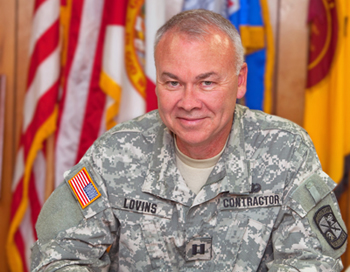
The U.S. Army’s Cadet Command has named retired Army Capt. Bob Lovins, Florida State University’s Army ROTC recruiting operations officer, its 2010 Recruiting Operations Officer of the Year.
The distinction signifies that under Lovins’ watch, FSU’s Army ROTC program, known as the Seminole Battalion, met its mission to transform Florida State and Tallahassee Community College students into lieutenants better than any of the other 273 Army ROTC battalions.
"This award is really not about me, but about core groups of people who work together to achieve the same goal," said Lovins, who received the same national distinction in 2006.
Lovins praised the battalion’s past and current military personnel, its staff of civilian employees and the cadets themselves. He also lauded Florida State’s faculty and staff, and the Tallahassee community at large — groups he characterized as highly supportive of ROTC’s mission.
Lovins spends a limited amount of time discussing the advantages of the ROTC with high school students at college fairs. For the most part, he focuses his recruiting efforts on the Florida State campus.
"This is the best place to recruit because the students here have already made the cut to get into Florida State," Lovins said. "I do a lot of recruiting right here in my office with assistance from the cadets who are in the program already. They are the best recruiters because they tell their peers about the training they’ve received in order to be able to do a certain job two or three years down the road."
When it comes to explaining the ROTC to potential recruits, Lovins tells them that being a lieutenant is the toughest job in America but also the most rewarding.
"Most officers say their favorite time in the Army was serving as a lieutenant, when they had the opportunity to lead and have a direct influence on their troops," Lovins said.
A lieutenant’s first job is usually as a platoon leader, leading 40 to 50 soldiers. Most businesses in America have fewer employees than a typical 22-year-old second lieutenant manages.
"I tell potential recruits they cannot beat the experience, regardless of what their technical skill sets are," Lovins said. "This is going to prepare them for any other challenge they will have in life. When they finish their service, they’ll have a proven track record."
As platoon leaders, lieutenants also are responsible for equipment worth hundreds of thousands or millions of dollars, and the battlefield decisions they make can easily have international ramifications.
"Our lieutenants must be agile, smart and morally upright," he said.
When Lovins started at FSU in 1997, the Seminole Battalion had about 75 cadets. Despite being a nation at war, the battalion has grown to about 180 cadets.
"Young people today want to serve, at least at Florida State," he said. "There is a real sense in this student body of young people who want to make a difference. And one of the places that they can make a big difference is as a military officer."
Even though he is a tremendous advocate of ROTC, Lovins is not an ROTC alumnus.
"I was going to school in the mid-1970s at West Georgia College (now the University of West Georgia), working two jobs," he said. "I told myself, ‘There has to be an easier way of doing this.’ At the tail end of Vietnam, there wasn’t a big emphasis on ROTC, so I went down to the recruiter and enlisted."
Lovins intended to serve three or four years of active duty and then use the GI Bill’s education benefits to pay for his tuition. In January 1976, he started basic training at Fort Ord, Calif., and unexpectedly fell in love with the Army. After eight years of enlisted time, he went to Officer Candidate School. Nearly 35 years later, Lovins has earned two Associate of Arts degrees (general studies, German), a bachelor’s degree with a double major (history, political science), and two master’s degrees (history, philosophy). Currently, he is working toward a doctorate in history from Florida State.
"The Army paid for my education in one shape, form or fashion," he said. "I wound up achieving my objective, just not in the way I imagined. As an academic adviser to the Seminole Battalion cadets, I try to return some small portion of all the Army has done for me."
For more information, contact Col. Gregory D. Allen, FSU Army ROTC battalion commander, at (850) 644-1016 or gdallen@fsu.edu.




